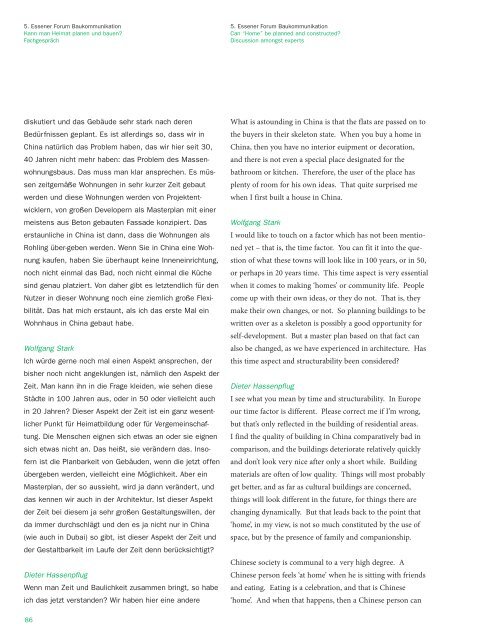download - Get a Free Blog
download - Get a Free Blog
download - Get a Free Blog
Erfolgreiche ePaper selbst erstellen
Machen Sie aus Ihren PDF Publikationen ein blätterbares Flipbook mit unserer einzigartigen Google optimierten e-Paper Software.
5. Essener Forum Baukommunikation<br />
Kann man Heimat planen und bauen?<br />
Fachgespräch<br />
diskutiert und das Gebäude sehr stark nach deren<br />
Bedürfnissen geplant. Es ist allerdings so, dass wir in<br />
China natürlich das Problem haben, das wir hier seit 30,<br />
40 Jahren nicht mehr haben: das Problem des Massenwohnungsbaus.<br />
Das muss man klar ansprechen. Es müssen<br />
zeitgemäße Wohnungen in sehr kurzer Zeit gebaut<br />
werden und diese Wohnungen werden von Projektentwicklern,<br />
von großen Developern als Masterplan mit einer<br />
meistens aus Beton gebauten Fassade konzipiert. Das<br />
erstaunliche in China ist dann, dass die Wohnungen als<br />
Rohling über-geben werden. Wenn Sie in China eine Wohnung<br />
kaufen, haben Sie überhaupt keine Inneneinrichtung,<br />
noch nicht einmal das Bad, noch nicht einmal die Küche<br />
sind genau platziert. Von daher gibt es letztendlich für den<br />
Nutzer in dieser Wohnung noch eine ziemlich große Flexibilität.<br />
Das hat mich erstaunt, als ich das erste Mal ein<br />
Wohnhaus in China gebaut habe.<br />
Wolfgang Stark<br />
Ich würde gerne noch mal einen Aspekt ansprechen, der<br />
bisher noch nicht angeklungen ist, nämlich den Aspekt der<br />
Zeit. Man kann ihn in die Frage kleiden, wie sehen diese<br />
Städte in 100 Jahren aus, oder in 50 oder vielleicht auch<br />
in 20 Jahren? Dieser Aspekt der Zeit ist ein ganz wesentlicher<br />
Punkt für Heimatbildung oder für Vergemeinschaftung.<br />
Die Menschen eignen sich etwas an oder sie eignen<br />
sich etwas nicht an. Das heißt, sie verändern das. Insofern<br />
ist die Planbarkeit von Gebäuden, wenn die jetzt offen<br />
übergeben werden, vielleicht eine Möglichkeit. Aber ein<br />
Masterplan, der so aussieht, wird ja dann verändert, und<br />
das kennen wir auch in der Architektur. Ist dieser Aspekt<br />
der Zeit bei diesem ja sehr großen Gestaltungswillen, der<br />
da immer durchschlägt und den es ja nicht nur in China<br />
(wie auch in Dubai) so gibt, ist dieser Aspekt der Zeit und<br />
der Gestaltbarkeit im Laufe der Zeit denn berücksichtigt?<br />
Dieter Hassenpflug<br />
Wenn man Zeit und Baulichkeit zusammen bringt, so habe<br />
ich das jetzt verstanden? Wir haben hier eine andere<br />
86<br />
5. Essener Forum Baukommunikation<br />
Can “Home” be planned and constructed?<br />
Discussion amongst experts<br />
What is astounding in China is that the flats are passed on to<br />
the buyers in their skeleton state. When you buy a home in<br />
China, then you have no interior euipment or decoration,<br />
and there is not even a special place designated for the<br />
bathroom or kitchen. Therefore, the user of the place has<br />
plenty of room for his own ideas. That quite surprised me<br />
when I first built a house in China.<br />
Wolfgang Stark<br />
I would like to touch on a factor which has not been mentioned<br />
yet – that is, the time factor. You can fit it into the question<br />
of what these towns will look like in 100 years, or in 50,<br />
or perhaps in 20 years time. This time aspect is very essential<br />
when it comes to making ‘homes’ or community life. People<br />
come up with their own ideas, or they do not. That is, they<br />
make their own changes, or not. So planning buildings to be<br />
written over as a skeleton is possibly a good opportunity for<br />
self-development. But a master plan based on that fact can<br />
also be changed, as we have experienced in architecture. Has<br />
this time aspect and structurability been considered?<br />
Dieter Hassenpflug<br />
I see what you mean by time and structurability. In Europe<br />
our time factor is different. Please correct me if I’m wrong,<br />
but that’s only reflected in the building of residential areas.<br />
I find the quality of building in China comparatively bad in<br />
comparison, and the buildings deteriorate relatively quickly<br />
and don’t look very nice after only a short while. Building<br />
materials are often of low quality. Things will most probably<br />
get better, and as far as cultural buildings are concerned,<br />
things will look different in the future, for things there are<br />
changing dynamically. But that leads back to the point that<br />
‘home’, in my view, is not so much constituted by the use of<br />
space, but by the presence of family and companionship.<br />
Chinese society is communal to a very high degree. A<br />
Chinese person feels ‘at home’ when he is sitting with friends<br />
and eating. Eating is a celebration, and that is Chinese<br />
‘home’. And when that happens, then a Chinese person can


